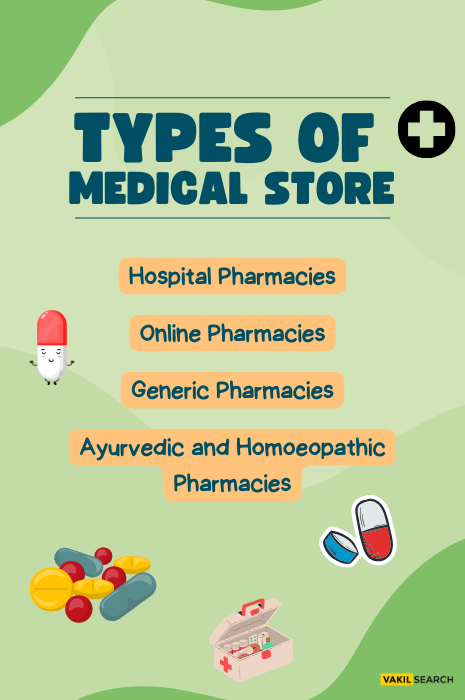Starting a pharmacy or medical store involves navigating complex regulations, and efficiently managing a range of medical products. Learn about the same today
Different Formats of Pharmacy Business in India
There are two main formats of pharmacy businesses in India:
- Stand-alone pharmacies: These are the most common type of pharmacy in India. They are typically small, independent businesses that are owned and operated by a pharmacist. Stand-alone pharmacies offer a wide range of prescription and over-the-counter medications, as well as other healthcare products and services.
- Chain pharmacies: Chain pharmacies are larger pharmacies that are owned and operated by a corporation. They typically have multiple locations in different cities and states. Chain pharmacies offer a similar range of products and services to stand-alone pharmacies, but they may also have additional features, such as drive-thru windows and 24-hour service.
Types of Medical Store
In addition to the two main formats discussed above, there are also a number of other types of medical stores in India, including:

- Hospital pharmacies: These pharmacies are located within hospitals and provide medications and other healthcare products to patients and hospital staff.
- Online pharmacies: Online pharmacies sell medications and other healthcare products over the Internet.
- Generic pharmacies: Generic pharmacies sell generic versions of brand-name medications.
- Ayurvedic and homeopathic pharmacies: These pharmacies sell traditional Indian and homeopathic medicines.
Investment Required in Pharmacy Business
The investment required to start a pharmacy business in India varies depending on the size and format of the business. For example, starting a stand-alone pharmacy business may require an investment of ₹5-10 lakhs, while starting a chain pharmacy business may require an investment of ₹1 crore or more.
Requirements for Opening a Medical Store
To open a medical store in India, you must have a valid pharmacy license. Pharmacy licenses are issued by the State Pharmacy Council in each state. To obtain a pharmacy license, you must meet the following requirements:
- You must be a registered pharmacist in good standing.
- You must have premises that are suitable for operating a pharmacy.
- You must have the necessary equipment and supplies.
- You must have a qualified pharmacist in charge of the pharmacy.
Once you have met all of the requirements, you can apply for a pharmacy license from the State Pharmacy Council.
Steps for Starting a Pharmacy Business in India
- Choose a business structure: The first step is to choose a business structure for your pharmacy business. The most common business structures for pharmacy businesses in India are proprietorship, partnership, one-person company (OPC), private limited company, and limited liability partnership (LLP).
- Register your business: Once you have chosen a business structure, you need to register your business with the appropriate authorities. The private limited company registration process will vary depending on the business structure you choose.
Medical Store Registration
To register a medical store in India, you need to apply for a pharmacy license from the State Pharmacy Council in the state where you plan to operate your business. To obtain a pharmacy license, you must meet the following requirements:
- You must be a registered pharmacist in good standing.
- You must have premises that are suitable for operating a pharmacy.
- You must have the necessary equipment and supplies.
- You must have a qualified pharmacist in charge of the pharmacy.

Proprietorship Registration
To register a proprietorship business, you need to file a Declaration of Proprietorship with the Registrar of Firms. You can file this declaration online or by visiting the office of the Registrar of Firms in person.
Partnership Registration
To register a partnership business, you need to file a Partnership Deed with the Registrar of Firms. You can file this deed online or by visiting the office of the Registrar of Firms in person.
One Person Company (OPC) Registration
To register an OPC, you need to file an application with the Ministry of Corporate Affairs (MCA). You can file this application online through the MCA portal.
Private Limited Company Registration
To register a private limited company, you need to file an application with the MCA. You can file this application online through the MCA portal.
Limited Liability Partnership (LLP) Registration
To register an LLP, you need to file an application with the MCA. You can file this application online through the MCA portal.
- Obtain a pharmacy license: Once you have registered your business, you need to obtain a pharmacy license from the State Pharmacy Council in the state where you plan to operate your business. To obtain a pharmacy license, you must meet the requirements listed above.
- Set up your pharmacy: Once you have obtained a pharmacy license, you need to set up your pharmacy. This includes finding a suitable location, renovating the premises, and purchasing the necessary equipment and supplies.
- Hire staff: You will need to hire qualified staff to operate your pharmacy. This includes pharmacists, pharmacy assistants, and other support staff.
- Stock your pharmacy: You need to stock your pharmacy with a variety of prescription and over-the-counter medications, as well as other healthcare products and services.
- Market your pharmacy: Once your pharmacy is set up and stocked, you need to market your business to attract customers. You can market your pharmacy through a variety of channels, such as print advertising, online advertising, and social media.
Documents Required for Medical Store Registration
The documents required for company registration in india as a medical store or pharmacy in India may vary by state and local regulations. However, some common documents often required include:
- Shop Establishment License: Obtained from the local municipal corporation or authority.
- Drug License: A license to sell and dispense medicines, which is issued by the State Drug Control Department.
- GST Registration: Goods and Services Tax, GST registration is required for tax compliance.
- FSSAI License: If you plan to sell dietary supplements or health products.
- Identity and Address Proof: Personal identification documents, such as Aadhaar, PAN, and proof of address.
- Ownership Proof: Property documents or rental agreement for the store.
- Partnership Deed or Memorandum of Association: If applicable, for businesses with multiple owners or partners.
- Pharmacist Registration: Ensure that a registered pharmacist is employed or associated with the business.
- Trade License: Required from the local municipal authority.
Pharmacy Business FAQs
Is e-pharmacy also a type of pharmacy shop?
Yes, e-pharmacy (online pharmacy) is a type of pharmacy shop that operates online. It allows customers to order medicines and healthcare products through a website or mobile app and have them delivered to their doorstep.
Is owning a pharmacy profitable?
The profitability of owning a pharmacy can vary based on factors such as location, competition, business model, and pricing strategy. Many pharmacies are profitable due to the consistent demand for medicines and healthcare products. However, success also depends on effective management and compliance with regulatory requirements.
Can I rent my pharmacy license in India?
In India, it is generally not permissible to rent or lease a pharmacy license. The license holder is typically required to be actively involved in the business, and the license is non-transferable without the approval of the relevant authorities.
Can a nurse open a pharmacy?
In India, the ownership and operation of a pharmacy typically require the presence and involvement of a registered pharmacist. While a nurse may be associated with the pharmacy and provide healthcare services, the legal ownership and operation of the pharmacy are usually reserved for qualified pharmacists.
What is the salary of a government pharmacist in India?
The salary of a government pharmacist in India can vary depending on factors such as the state or union territory, the level of government (central or state), and the pharmacist's experience and qualifications. Government pharmacists generally receive competitive salaries and benefits, and these can range from around INR 30,000 to INR 60,000 per month or more.
Where does the Indian pharmaceutical market stand in the world?
The Indian pharmaceutical market is one of the largest in the world, both in terms of production and consumption. India is a major player in the global pharmaceutical industry, producing a wide range of medicines and exporting them to many countries. The country is known for its generic drug manufacturing and research capabilities.
Is GST no. mandatory for opening a chemist shop?
Yes, GST registration is generally mandatory for a chemist shop in India if the business's turnover exceeds the prescribed threshold limit. GST is applicable to the sale of medicines and healthcare products, and compliance with GST regulations is required.
What is the cost of a pharmacy setup in India?
The cost of setting up a pharmacy in India can vary widely based on factors such as location, size, and the range of products and services offered. A small, independent pharmacy may require an initial investment of several lakhs of rupees, while a larger, chain pharmacy may require several crores or more. It's essential to create a detailed business plan and budget to determine the specific cost of your pharmacy setup.

